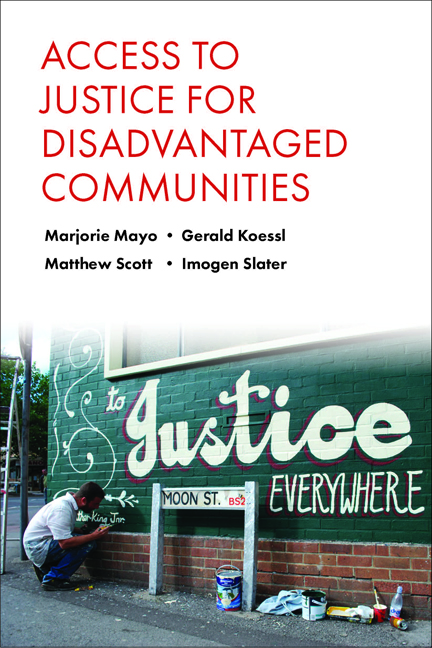Book contents
- Frontmatter
- Dedication
- Contents
- Acknowledgements
- Abbreviations and glossary
- Introduction: accessing social justice in disadvantaged communities
- one Social justice and the welfare state
- two Concepts of justice and access to justice
- three Ethos and values
- four Challenges and dilemmas
- five Public service modernisation, restructuring and recommodification
- six Conflict and competition versus collaboration and planning
- seven Public service modernisation and time
- eight Alienation and demoralisation, or continuing labours of love?
- nine Access to social justice for disadvantaged communities: value and values
- Appendix 1 Research methodology and questionnaire
- Appendix 2 Law Centres included
- Appendix 3 Topic guides for semi-structured interviews
- References
- Index
six - Conflict and competition versus collaboration and planning
Published online by Cambridge University Press: 01 February 2022
- Frontmatter
- Dedication
- Contents
- Acknowledgements
- Abbreviations and glossary
- Introduction: accessing social justice in disadvantaged communities
- one Social justice and the welfare state
- two Concepts of justice and access to justice
- three Ethos and values
- four Challenges and dilemmas
- five Public service modernisation, restructuring and recommodification
- six Conflict and competition versus collaboration and planning
- seven Public service modernisation and time
- eight Alienation and demoralisation, or continuing labours of love?
- nine Access to social justice for disadvantaged communities: value and values
- Appendix 1 Research methodology and questionnaire
- Appendix 2 Law Centres included
- Appendix 3 Topic guides for semi-structured interviews
- References
- Index
Summary
This chapter explores the pressures of increasing conflict and competition, on the one hand, as against the challenges involved in promoting collaboration and planning, on the other hand. The first section summarises the tendencies towards conflict and competition that had impacted on Law Centres’ relationships with other agencies in the past. This sets the context for the discussion of public service modernisation, with its associated pressures towards increasing competition in more recent times – despite New Labour's attempts to promote partnership working in parallel. The final section explores the countervailing strategies that have been developed in a number of Law Centres, where the approach has been to build collaborative relationships, with joint planning in order to deliver more joined-up services aiming to meet clients’ needs more holistically as well as more cost-effectively. This final section includes illustrations from case studies of collaborative strategies, as were being developed in particular Law Centres such as Avon and Bristol, Coventry and Nottingham, for example.
Pressures to collaborate or to compete
With public service modernisation creating increasingly competitive environments, there have been inherent tensions for many third sector organisations which have been required to compete for contracts, but also to collaborate, working with partners to provide services most cost-effectively. As previous chapters have already pointed out, public service modernisation agendas shifted under the New Labour government, with less emphasis upon privatisation and competition per se and increasing emphasis upon the importance of developing cross-sectoral partnerships (although competition was still a significant feature) (Newman and Clarke, 2009). As Alan Milburn has already been quoted as concluding, such partnerships were to be ‘the cornerstone of the Government's modernisation programme in Britain’, ‘central to our drive to modernise key public services’ (Milburn, 2001, p 33).
There were competing pressures, then, as third sector organisations struggled to survive in an increasing competitive climate. Partnership working was being promoted as a strategy for survival, but partnership working also entailed potential risks, and particularly so when there were significant power imbalances between the different partners involved (Balloch and Taylor, 2001; Glendinning et al, 2002). Smaller organisations, such as Law Centres, tended to feel particularly vulnerable, fearful of being swamped by more powerful partners, afraid that partnerships (particularly partnerships involving the private sector) would undermine their distinctive ethos.
- Type
- Chapter
- Information
- Access to Justice for Disadvantaged Communities , pp. 75 - 92Publisher: Bristol University PressPrint publication year: 2014



